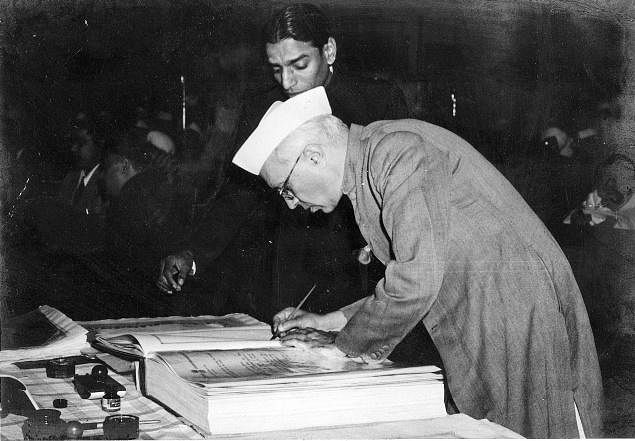On Jawaharlal Nehru’s 128th birth anniversary, many of his political, philosophical and cultural ideas appear to be under assault. Nehru, the first Prime Minister of India, is in danger of being ghettoised as merely a Congress party politician.
Will Nehru’s political and philosophical vision for India endure?
No great leader, his legacy, or his vision can be completely erased. Contexts will change, interpretations of actions will be reviewed, and personality will be psychoanalysed by new insights. But neither Lincoln, nor Lenin, nor Gandhi, nor Nehru, will disappear into oblivion.
The effort to negate and erase Jawaharlal Nehru’s ideas and ideals, impact and vision, is currently on with a vengeance. These people fear Nehru’s political and philosophical ghosts, as if they are going to rise from the ashes. The paradox is that those who hate him intensely keep his memory alive!
Even mediapersons who have not seen his era and do not know much about him (except through the politics of Indira, Rajiv, Sonia, or Rahul) have negative perceptions of the man. The habit of reading recent or contemporary history has almost entirely disappeared in the journalistic community these days.
Ironically, even prejudices about Nehru keep his legacy flowing. In the post-World War II period, there were not many leaders who strolled the world like colossi. Mao Zedong, Joseph Stalin, Ho Chi Minh, and Fidel Castro, were iconic figures, all communists of various hues. Nehru and Gamal Abdel Nasser were not communists, and yet became legends.
Nehru’s passionate secular principles, committed anti-colonialism, idealistic welfare economics (Fabian), ‘socialistic pattern’ (not socialist), international network of intellectuals and writers and scientists (including Bertrand Russell, George Bernard Shaw, and Albert Einstein), and his love for nature and the arts defined his personality and philosophy of life. Naturally, his footprints can be seen in Kolkata and London, Chennai and New York.
He chose the public sector route, but he allowed the private sector to grow. Otherwise, there would have been no Birlas or Tatas or others. His launching of IITs, IIMs, and institutions like Tata Institute of Fundamental Research developed hundreds and thousands of engineers, scientists, technocrats, and managers. They still cherish his memory, his legacy and his personality.
There would not have been a ‘modern’ India without Nehru.
Kumar Ketkar is a senior journalist and columnist



